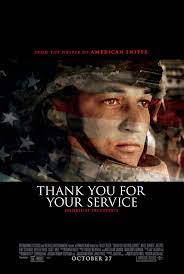
THANK YOU FOR YOUR SERVICE
US, 2017, 109 minutes, Colour.
Miles Teller, Beulah Koale, Joe Cole, Scott Haze, Haley Bennett, Amy Schumer, Omar J.Dorsey, Keisha Castle-Hughes, David Morse, Mark Weber.
Directed by Jason Hall.
This is a grim war film, scenes of action in Iraq, some of them quite devastating on a personal level for those concerned, injured or dead. This is a grim war film in terms of the aftermath, post traumatic stress disorder. The first film written and directed by Jason Hall, it is based on a non-fiction book about war action and the aftermath.
The film focuses on Adam, played by a Miles Teller, decorated, seen as heroic, but plagued his by memories and nightmares of his feeling responsible for injuries and deaths of fellow soldiers, friends. He is supported by his wife, Haley Bennett, and two children.
However, he is concerned, especially with two of those returning from Iraq, one, played by Joe Cole, who finds that his fiancee has taken his money and children – and kills himself in front of her. The other is an American Samoan soldier, Beulah Koale, friendly, decent, but failing to settle in, caught up with drug dealers.
There is also the wife of one of the men who took his place on a mission, took a wrong turn, hit a mine, and while others were saved, he was inadvertently left behind and died in the fire. The wife is played by Amy Schumer in an unexpectedly serious performance.
The film was well received but was not successful at the box office, one of those films that many Americans with associations from Iraq and Afghanistan, injuries and deaths, post-traumatic stress disorder, Warren willing to watch.
- The title? The American government and public towards those who served in the military? The irony concerning their treatment after the war, PTSD?
- The war sequences, the opening, the roof, the shops, Adam carrying Emery down the steps, falling? The consequences? The final, and explaining the situation to Amanda, the mission, Doster telling him to rest, the attack, pulling the victims from the vehicle? The impact of watching the war sequences? And their consequences on the men?
- The return home, Adam, Tausolo, Billy Waller? Jokes on the plane? The welcome home, family, Amanda asking Adam for explanations, the bands in the cheers?
- Billy Waller’s story, his fiancee, the empty house, the phone calls, desperate, staying the night with Adam, the gun, going to the bank, confronting his fiancee, her reactions, his shooting himself? The funeral, everybody gathered, the grief?
- Adam’s story, Saskia and the children, wanting to go back to their house? Adam, seemingly okay, private thoughts, suicidal? Supporting Billy Waller? Supporting dorsal? Their discussions, going hunting, the night classes, Adam seeing things? Ordinary lives, the possibility of jobs? The going to the headquarters, waiting for their turn, the interviews, the number of veterans lining up? Amanda giving him the California address? The tensions with Saskia, not communicating with her? Going to the veterans’ office, filling out the forms, the interrogations, admitting difficulties? Saskia reading the document? His love for his children, dropping Jackson? Upset, going to visit Emory, their discussions, memories, Emory’s gratitude for Adam saving his life? The phone from Tausolo, under the bridge, the shooting, rescuing him? Putting him on the bus for California? Self-sacrifice?
- Tausolo’s story, action, grateful to the military, his girlfriend, the return home, her pregnancy? His lack of memory, disturbed? Discussions with Adam? Hunting? The drugs? Wanting drugs, the contacts? The deal is wanting him to drive the car? The news of the birth, going to the hospital, the impact of the baby? The dangers, the drug dealers on the set up, shooting? Help from Adam, Adam putting him on the bus to California?
- Mike Emory, the episode in Iraq, his injuries, his brain? Crippled? The fall, life saved, going to Arkansas, living in retirement, disabled, the effect of the visit from Adam?
- The picture of the military officials, the former officer urging Adam not to give bad example to the younger men? The attitudes of those behind the desks, not understanding post-traumatic stress? The sympathetic women?
- The film reflecting on Americans in Iraq in the 2000s, the impact?